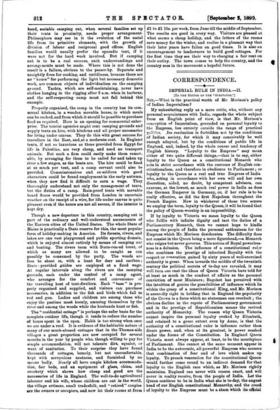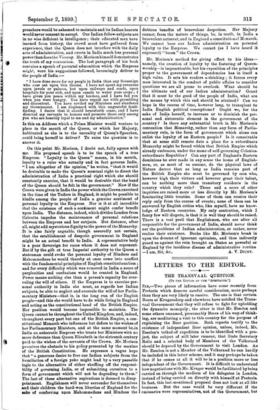CORRESPONDENCE.
IMPERIAL RULE IN INDIA.—II.
[TO TRH EDITOR OF THE "SPECTATOR."]
Si,—What is the practical worth of Mr. Morison's policy of Indian Imperialism ?
My unhesitating reply as a mere critic, who, without any personal acquaintance with India, regards the whole subject from an English point of view, is that Mr. Morison's conception of Imperialism, grounded on personal loyalty to the Empress, lies entirely outside the range of practical Its realisation is forbidden not by the conditions of Indian society, for which it may conceivably be well enough adapted, but by the conditions of public life in England, and, indeed, by the whole course and tendency of English history. "Loyalty to the Empress" may mean either of two quite different things,—that is to say, either loyalty to the Queen as a constitutional Monarch who acts in strict accordance with the customs of English con- stitutionalism, and therefore in obedience to Parliament ; or loyalty to the Queen as a real and true Empress of India who, acting in accordance with her own will and her own discretion, aided, no doubt, by competent advisers, can exercise, at the lowest, as much real power in India as does the German Emperor in Germany, or, if her rule is to be really effective, as did the first Napoleon throughout the French Empire. Now in whichever of these two senses we employ the term, loyalty to the Queen, it will be found that the policy of Queen-worship is an impossibility.
If by loyalty to Victoria we mean loyalty to the Queen who fulfils with infinite dignity and tact the duties of a Parliamentary Monarch, then we cannot hope to kindle among the people of India the personal enthusiasm for the Empress which Mr. Morison desiderates. The difficulty does not consist in the Queen being a mere figurehead,—a Monarch who reigns but never governs. This notion of Royal powerless- ness is a delusion. The influence of a constitutional rulsr who combines the prestige of inherited Royalty with the respect or veneration gained by sixty years of well-exercised authority is great. When towards the middle of the twentieth century the political secrets of to-day are revealed, it may well turn out that the ideas of Queen Victoria have told for at least as much in the conduct of affairs as the personal conviction of most Ministers ; Bagehot has perceived with the intuition of genius the possibilities of influence which lie within the grasp of a constitutional King, and Mr. Morison is assuredly right in holding that in England the popularity of the Crown is a force which no statesman can overlook ; the obvious decline in the repute of Parliamentary government and in the prestige of Republicanism means the revived authority of Monarchy. The reason why Queen Victoria cannot inspire the personal loyalty evoked by Elizabeth, and retained to a great extent even by Anne, is that the authority of a constitutional ruler is influence rather than direct power, and, when at its greatest, is power masked under the forms of the Constitution. In England Queen Victoria must always appear, at least, to be the mouthpiece of Parliament. She cannot at the same moment appear in India to be the autocratic, all-powerful Empress who arouses that combination of fear and of love which makes up loyalty. To preach veneration for the constitutional Queen would further come round to an indirect demand for that loyalty to the English race which, as Mr. Morison rightly maintains, England can never with reason exact, and will never in reality receive, from the people of India. Let the Queen continue to be in India what she is to-day, the august head of our English constitutional Monarchy, and the creed of loyalty to the Empress mast be a sham which its official preachers would be ashamed to maintain and its Indian hearers would never consent to accept. Our Indian fellow-subjects are in no wise deficient in intelligence ; their educated men have learned from history, the crowd must have gathered from experience, that the Queen does not interfere with the daily acts of administration, and exerts in India much less personal power than does tb e Viceroy. Mr. Morison himself demonstrates the truth of my contention. The last paragraph of his book
contains a speech of parental admonition which the Empress might, were his suggestions followed, becomingly deliver to the people of India I have done more for my people in India than any Sovereign who ever sat upon this throne. I have not spent my revenues upon jewels or palaces, but upon railways and roads, upon hospitals for your sick, and upon canals to water your crops ; I have given you peace within my borders, and I have fed you when you were hungry. You have repaid me with grumbling and discontent. You have reviled my Ministers and slandered my Government. I am displeased with this ungrateful fault- finding. I desire that it should henceforth cease, and I have directed my servants to honour and promote those only among you who are heartily loyal to me and my administration."
Is this an Address which a Prime Minister would venture to place in the mouth of the Queen, or which her Majesty, habituated as she is to the unreality of Queen's Speeches, could bring herself to deliver ? To raise the question• is to answer it.
On this point Mr. Morison, I doubt not, fully agrees with me. His proposed speech is to be the speech of a true Empress. "Loyalty to the Queen" means, in his mouth, loyalty to a ruler who actually and in fact governs India.
"I am altogether of the opinion," he writes, "that it would be desirable to make the Queen's nominal right to direct the
administration of India a practical right which she should constantly exercise, that it would be desirable that the-hand of the Queen should be felt in the government." Now if the Crown were given in India the power which the Crown exercised
in the time of the Tudors in England, it might be possible to kindle among the people of India a genuine sentiment of
personal loyalty-to the Empress. Nor is it at all incredible that the existence of such a sentiment might confer benefit upon India. The distance, indeed, which divides London from Calcutta impedes the maintenance of personal relations between the Empress and her subjects. But distance, after all, might add mysterious dignity to the power of the Monarchy. It is also fairly arguable, though assuredly, not certain, that the establishment of despotic government in England might be an actual benefit to India. A representative body is a poor Sovereign for races whom it does not represent. But if by the gift of true Imperial authority to the Queen a
statesman could evoke the personal loyalty of Hindoos and Ma.hommedans he would thereby at once come into conflict with the fundamental principles of English constitutionalism; and for every difficulty which was removed in India a score of perplexities and confusions would be created in England. Power means nothing else than a person's capacity for over- ruling the will of others. If the Empress is to exercise per- sonal authority in India she must, as regards her Indian subjects, be able to neglect and overrule the will of her Parlia- mentary Ministers—that is, in the long ran of the English people—and this she would have to do while living in England and acting as the constitutional head of the British Empire. Her position would become impossible to maintain. The Queen cannot be throughout the United Kingdom, and, indeed, throughout every part but one of the British Empire, a con- stitutional Monarch who influences but defers to the wishes of her Parliamentary Ministers, and at the same moment be.in India an autocratic Empress who treats her Ministers with no more deference than Queen Elizabeth in the sixteenth century paid to the wishes of the servants of the Crown. Mr. Morison perceives the obstacle to his policy presented by the maxims of the British Constitution. He expresses a vague hope that "a generous desire to free our Indian subjects -from the humiliation of a foreign yoke might lead by a very passable logic to the alternative of either shuffling off the responsi- bility of governing India, or of submitting ourselves to a form of government which will not be degrading to them."
The last of these alternative aspirations i doomed to disap- pointment. Englishmen will never surrender for themselves and their children the hard-won liberties of England for the sake of conferring upon Mahommedans and Hindoos the dubious benefits of benevolent despotism. Her Majesty cannot, from the nature of things, be, in truth, in India a benevolent autocrat, and in England a constitutional Monarch. We cannot base our Indian administration on personal loyalty to the Empress. We cannot (as I have heard it expressed) " boom " the Crown.
Mr. Morison's method for giving effect to his ideas— namely, the creation of loyalty by the fostering of Queen- worship—is impracticable, but his exposition of the principles proper to the government of dependencies has in itself a high value. It sets his readers a-thinking ; it forces every man interested in the conduct of public affairs to consider questions we are all prone to overlook. What should be the ultimate end of our Indian administration ? Grant that it must be the good of the people of India, what are the means by which this end should be attained ? Can we hope in the course of time, however long, to transplant to India English political conceptions ? Ought we, for the sake of India herself, to increase or to diminish the per. sonal and autocratic element in the government of the country ? Is there any substantial truth in Mr. Morison's contention that Monarchy, rather than any form of Parlia- mentary rule, is the form of government which alone can enlist the loyalty of an Eastern people ? Is it conceivable that at some still remote date a place for a subordinate Monarchy might be found within that British Empire which already embraces, under the name of self-governing Colonies, subordinate Republics ? Can any part of England's Eastern dominions be ever made in any sense the home of English- men, or, as most of us assume, do the physical laws of Nature decree that as long as India remains part of the British Empire she must be governed by men who, however high their virtues and however great their talent, can be nothing more than transitory residents in the country which they rule ? .These and a score of other inquiries are raised more or less directly by Mr. Morison's fascinating little treatise. Some of them can receive their reply only from the course of events; none of them can be answered by English crities who, like myself, have no know- ledge of Eastern countries. My only contention, which I fancy few will dispute, is that it is well they should be raised. There is a real peril that Englishmen,. who are after all responsible for the government of India, should never think out the problems of Indian administration, or rather, never realise their existence. Books like Mr. Morison's break in upon the dreams of ignorant optimism, and thus indirectly guard us against the rain brought on States as powerful as England by the insidious disease of administrative routine



































 Previous page
Previous page